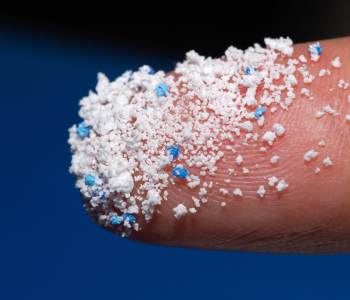Learning about microplastic pollution in the Kawartha Watershed
JUNE 5, 2023 – More than 917 tonnes of plastic waste was collected from Kawartha Lakes households in 2019, but even as the community continues to recycle responsibly, our local forests and waterways are negatively impacted by a type of pollution that is often invisible, known as microplastic pollution.
Microplastics are tiny, broken-down pieces of plastic that can be generated during plastic and clothing manufacturing processes, as well as further down the line as household items and clothing fibers begin to break down. Generally smaller than 5mm in size, particles easily spread across the environment, polluting natural spaces and damaging vital ecosystems.

“Microplastics are somewhat of an invisible threat because even once a water sample has been collected, particles can be hard to spot with the naked eye,” said Kawartha Conservation’s Assistant Watershed Resources Technician, Nathan Rajevski. “As these pollutants work their way into local waterways, they can be swallowed by fish and other organisms, wash up on shore, and will negatively impact water quality.”
In 2021, Kawartha Conservation joined Katrina Karl and other members from Trent University’s Environmental GeoScience Research Group to collect water samples and learn more about the presence of microplastics in Lake Scugog. Collecting lake, rainwater, sediment, and air samples, Karl’s research found that approximately 29% of microplastics that flowed into Lake Scugog were retained in the lake.
“Katrina’s research is crucial for understanding how everyday plastic is dispersed once it has been released into the environment, and will help inform targeted actions for the protection, restoration, and sustainability of Lake Scugog for years to come,” said Rajevski.
World Environment Day is an annual event that uses the power of storytelling to encourage awareness and action across the world for the protection of the environment. Led by the United Nations each year on June 5, this year’s theme is #BeatPlasticPollution.
“By recycling properly, using reusable products, and supporting environmental organizations in your area, you can help make a positive impact on local ecosystems and join the fight to beat plastic pollution,” said Rajevski.
Contact Us
Kawartha Conservation
277 Kenrei Road
Lindsay, ON K9V 4R1
Tel: 705.328.2271
Fax: 705.328.2286
Subscribe to Receive Updates and Notifications
Stay up to date on flood and low water, news, activities, events, programs and operations by subscribing to updates and the Watershed Watch Newsletter.
